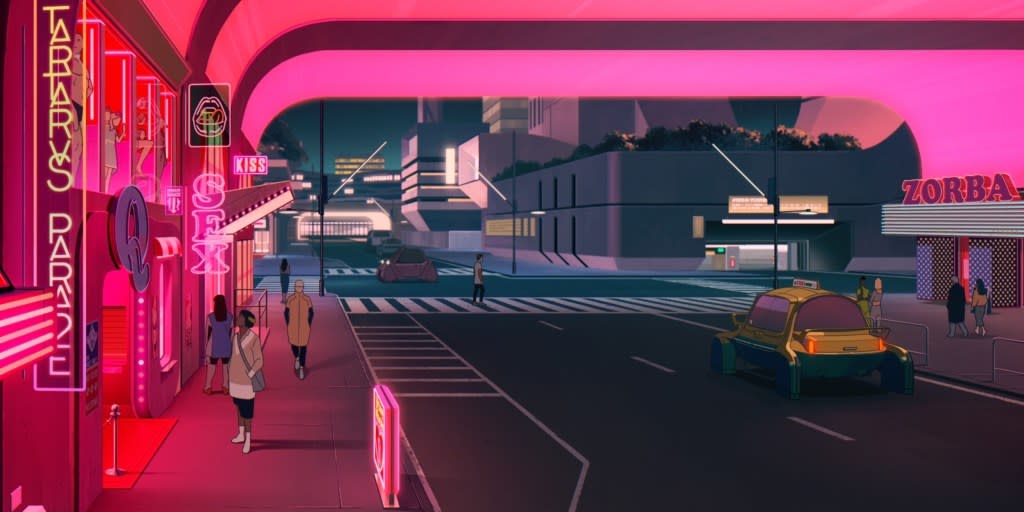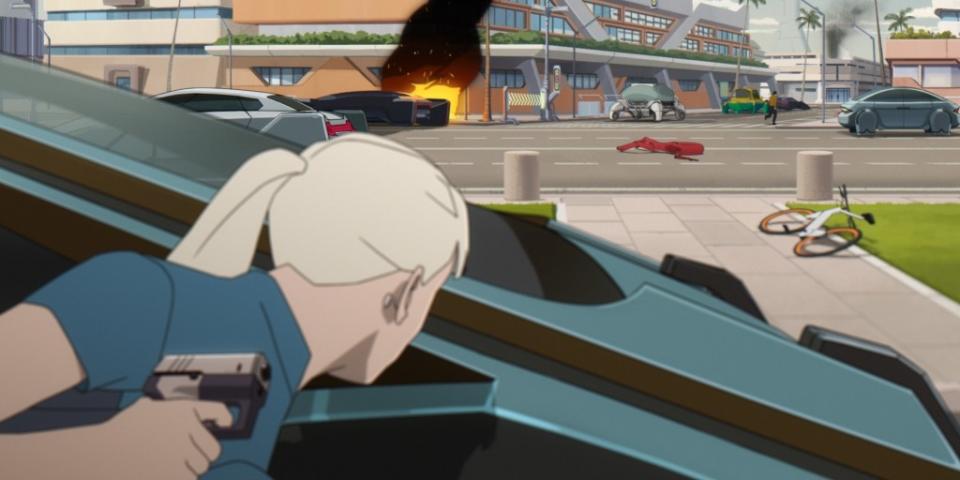Mars Express Director Jérémie Périn Talks Sci-Fi, Taking Influence from Anime

ComingSoon Editor-in-Chief Tyler Treese spoke to Mars Express director Jérémie Périn about the animated sci-fi movie. The director discussed anime influences, his brutal world, and more. GKIDS is releasing Mars Express in select theaters on May 3, 2024.
“In 2200, private detective Aline Ruby and her android partner Carlos Rivera are hired by a wealthy businessman to track down a notorious hacker. On Mars, they descend deep into the underbelly of the planet’s capital city where they uncover a darker story of brain farms, corruption, and a missing girl who holds a secret about the robots that threatens to change the face of the universe,” reads the synopsis.

Tyler Treese: I wanted to ask you about the opening because you get straight to it. The neck break scene is so brutal. I wasn’t expecting it. How was it setting that tone with the opening scene?
Jérémie Périn: I like the audience to be surprised. I thought that this way of killing someone would be shocking. Even if it’s not gory, there’s no blood or stuff, but it’s a weird way to kill someone. It was a way to show that the guy wasn’t normal. It’s not a classic human. A normal human couldn’t do that. It has to be a surprise for the audience. Also, it’s a way to give the tone of the fact that the movie can twist at any moment. Since the beginning, you have this feeling that at any time, everything can happen. It was the opening of a movie has to be a program of what you can expect during the process of watching the movie.
You shocked me first when we saw the cat, and it was unzipped.
I wanted to add this as an example. Like the fact you have a normal cat and suddenly you can zip is fair and it’s a robot. It’s also a way to tell the audience [that] everything is not exactly how it looks. Beware of the appearances, human — maybe they are robots. All the natural and artificial aspects of the movie are blurry. I ask the audience to pay attention to the details. It’s a way to explain that to the audience in a playful way.
One aspect I really enjoyed was determining how far future this was, where they were in their advanced civilization. How was figuring out how sci-fi we were getting here?
We aimed to create a pragmatical sci-fi, something like art science. We consulted specialists, scientists, and experts in the field, including the designer of Aline and Carlos’ cars, Felix Godar. He collaborated with us on the concept and functionality of the car. For the software takeover depicted in the movie, we engaged real programmers, seeking inspiration from Spielberg’s approach in Minority Report. Drawing on insights from numerous scientists and Silicon Valley experts, we explored the potential evolution of technology in the near future. The setting is 2000 in the movie—a deliberate choice to avoid being corrected post-fact.
Mars Express is just gorgeous. What were the primary influences on your animation and visual style that really helped influence this movie?
Probably the Japanese animation, specifically the nineties, Japan made, at a time where it’s difficult. I grew up with Japanese animation influence, always kind of deluxe animation. At some point, Japanese animation had a much lower budget. To compensate for the lower budget compared to American animation, they invented a lot of tricks and worked a lot on staging and frames to give impact to their picture shots to compensate lack of drawings. Little by little, they have the possibility to make something more luxury, but keeping this way of doing their storyboards, work on depth in the field of their frames.
Something very cinematic in the live-action way of thinking and the staging, and this gave me inspiration. Especially for this movie, I think it’s the sci-fi and realistic Japanese animation from the eighties, nineties, and early 2000s, going from Akira to Satoshi Kon’s movies, and in the middle, there are different directors such as Mamoru Oshii, Yoshiaki Kawajiri, those guys working in the field of movies. OVA, original video for animation, or original animation for video, like DTV, but with animation at the time.
This is for the animation techniques and the way of apprehending the medium. But there’s a lot more influence about Mars Express and mostly film noir like Chinatown or coming from live-action pictures, like The Long Goodbye or Kiss Me Deadly, American classics with investigation buddy movies and stuff like that.
You’ve done a lot of great work in the television format. What was most interesting or challenging about working on a feature film and directing a feature film for the first time?
It’s very pragmatical. When you are doing a TV show and a feature film, you have more or less the same time to do both. A movie is shorter than a TV show in the end because if you put all the episodes together, it’s not the same time at all. Talking about season one of a TV show I directed, in the end, it’s about five hours and something minutes, while a feature film is only one hour and 25 minutes. You have the same time to work on something smaller but in a way, you have the privilege to work even better and more on this smaller object, you know?
You can really cherish it, while a TV show, you have to go and go and go, and you don’t have time to think too much about what you are doing. You are a lot in improvisation. You have to deliver one episode after another to the broadcaster. While a movie is still in the oven, all along the production, you know it, you have time to change your mind. Let’s say you want to do some rhymes apart from the beginning and the end. You can still arrange stuff like that at the same time. With a TV show, you can’t. To me, I think it’s better. I prefer to work on a feature film than a TV show. Just for that possibility of sharing it and really walking in the detail.
Originally, when it was premiering at festivals, it had the great French dub, and now it also has this English dub. How is it as a director to see your own work and get to experience it in a new way with a fresh dub like this?
To be honest, I didn’t hear or watch the movie completely in English. I heard some excerpts and GKIDS were great to invite me to participate in the casting and to shoot with the main comedians, actors, and actresses. Thank you. To me, it’s a good opportunity. Because when you finish a movie, like Mar Express, but for every director, it’s the same. I can’t stand my own movie. I’ve watched it too many times. My emotional response to the movie and my relationship with it are broken. Usually, I need some time, like 10 years, to forget the movie and rediscover it. Watching it in a different language could be a way to have a new relationship with it and rediscover it. So, I’m really into watching it in English or even in other languages, in fact.
The post Mars Express Director Jérémie Périn Talks Sci-Fi, Taking Influence from Anime appeared first on ComingSoon.net - Movie Trailers, TV & Streaming News, and More.

